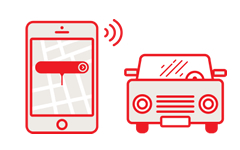Uber connects drivers with passengers in real time through a smartphone app. Like Airbnb, which matches travellers with rooms or apartments, Uber puts resources to use that might otherwise sit idle.
In a big-picture sense, this “Uberization” of the economy – a buzzword for technological disruption – is a positive development, says economics professor Jonathan Hall, because it allows people to earn more from assets they already own. Why leave your car in the garage all day when you can earn money by driving it?
The downside, says Hall, is that although this allows students, stay-at-home parents and other part-time workers to bring in extra cash, taxi drivers (and full-time employees in other industries being Uberized) risk being put out of work. The process creates winners and losers. But Hall adds that using our resources more optimally should make society as a whole better off. “In New York City alone, matching passengers with vehicles by using an app such as Uber could increase efficiency by $1 billion a year,” he says.
Recent Posts
Tuning into Tomorrow
AI can help musicians compose and create new sounds. Is it just another music-making tool – or something else?
U of T’s 197th Birthday Quiz
Test your knowledge of all things U of T in honour of the university’s 197th anniversary on March 15!
Are Cold Plunges Good for You?
Research suggests they are, in three ways






One Response to “ Uberization ”
Prof. Hall suggests why leave your car in the garage all day when you can earn money by driving it. The uber debate here in Sweden points out that, as a passenger, your driver (unlike a taxi driver) is not qualified or licensed to take paying passengers, does not pay business taxes, and a private car is not insured for commercial use (your tough luck if there’s an accident). There’s also the ethical question of amateurs taking work away from those who need it for their livelihood.
George Varcoe
BMus 1955
Österskär, Sweden